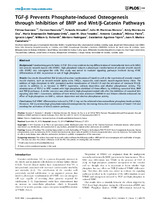TGF-β Prevents Phosphate-Induced Osteogenesis through Inhibition of BMP and Wnt/β-Catenin Pathways
Autor
Guerrero Pavón, Fátima
Herencia, Carmen
Almadén Peña, Yolanda
Martínez-Moreno, Julio M.
Montes de Oca, Addy
Rodríguez-Ortiz, Maria E.
Díaz Tocados, Juan Manuel
Florio, Mónica
López, Ignacio
Richards, William G.
Rodríguez Portillo, Mariano
Aguilera Tejero, Escolástico
Muñoz-Castañeda, Juan R.
Editor
Public Library of ScienceFecha
2014Materia
Vascular calcificationOsteogenesis
Growth factor-β
Phosphates
Mesenchymal stem cells
Cell differentiation
Phosphatases
DAPI staining
METS:
Mostrar el registro METSPREMIS:
Mostrar el registro PREMISMetadatos
Mostrar el registro completo del ítemResumen
Background: Transforming growth factor-b (TGF-b) is a key cytokine during differentiation of mesenchymal stem cells (MSC)
into vascular smooth muscle cells (VSMC). High phosphate induces a phenotypic transformation of vascular smooth muscle
cells (VSMC) into osteogenic-like cells. This study was aimed to evaluate signaling pathways involved during VSMC
differentiation of MSC in presence or not of high phosphate.
Results: Our results showed that TGF-b induced nuclear translocation of Smad3 as well as the expression of vascular smooth
muscle markers, such as smooth muscle alpha actin, SM22a, myocardin, and smooth muscle-myosin heavy chain. The
addition of high phosphate to MSC promoted nuclear translocation of Smad1/5/8 and the activation of canonical Wnt/bcatenin
in addition to an increase in BMP-2 expression, calcium deposition and alkaline phosphatase activity. The
administration of TGF-b to MSC treated with high phosphate abolished all these effects by inhibiting canonical Wnt, BMP
and TGF-b pathways. A similar outcome was observed in high phosphate-treated cells after the inhibition of canonical Wnt
signaling with Dkk-1. Conversely, addition of both Wnt/b-catenin activators CHIR98014 and lithium chloride enhanced the
effect of high phosphate on BMP-2, calcium deposition and alkaline phosphatase activity.
Conclusions: Full VSMC differentiation induced by TGF-b may not be achieved when extracellular phosphate levels are high.
Moreover, TGF-b prevents high phosphate-induced osteogenesis by decreasing the nuclear translocation of Smad 1/5/8 and
avoiding the activation of Wnt/b-catenin pathway.

